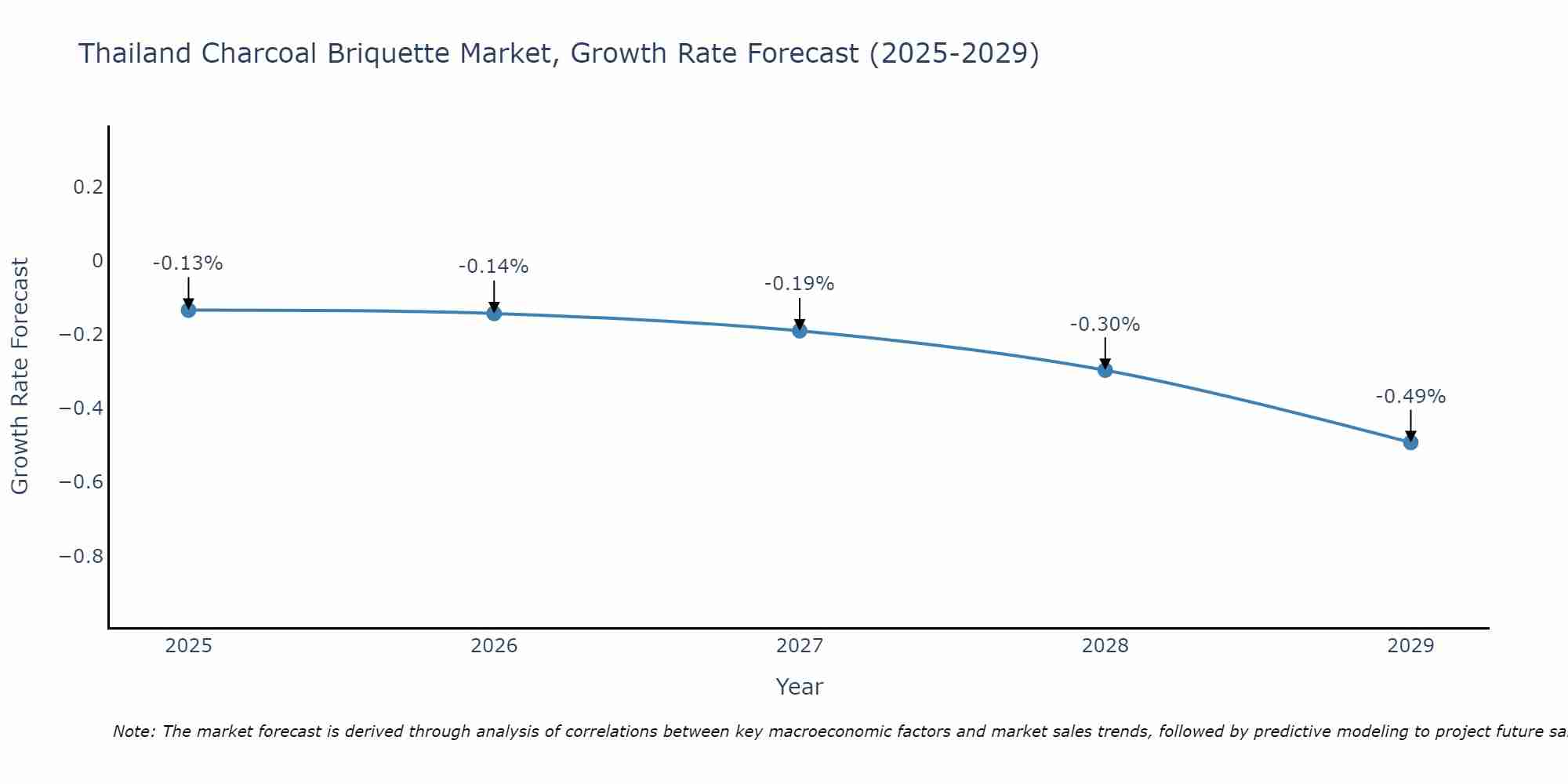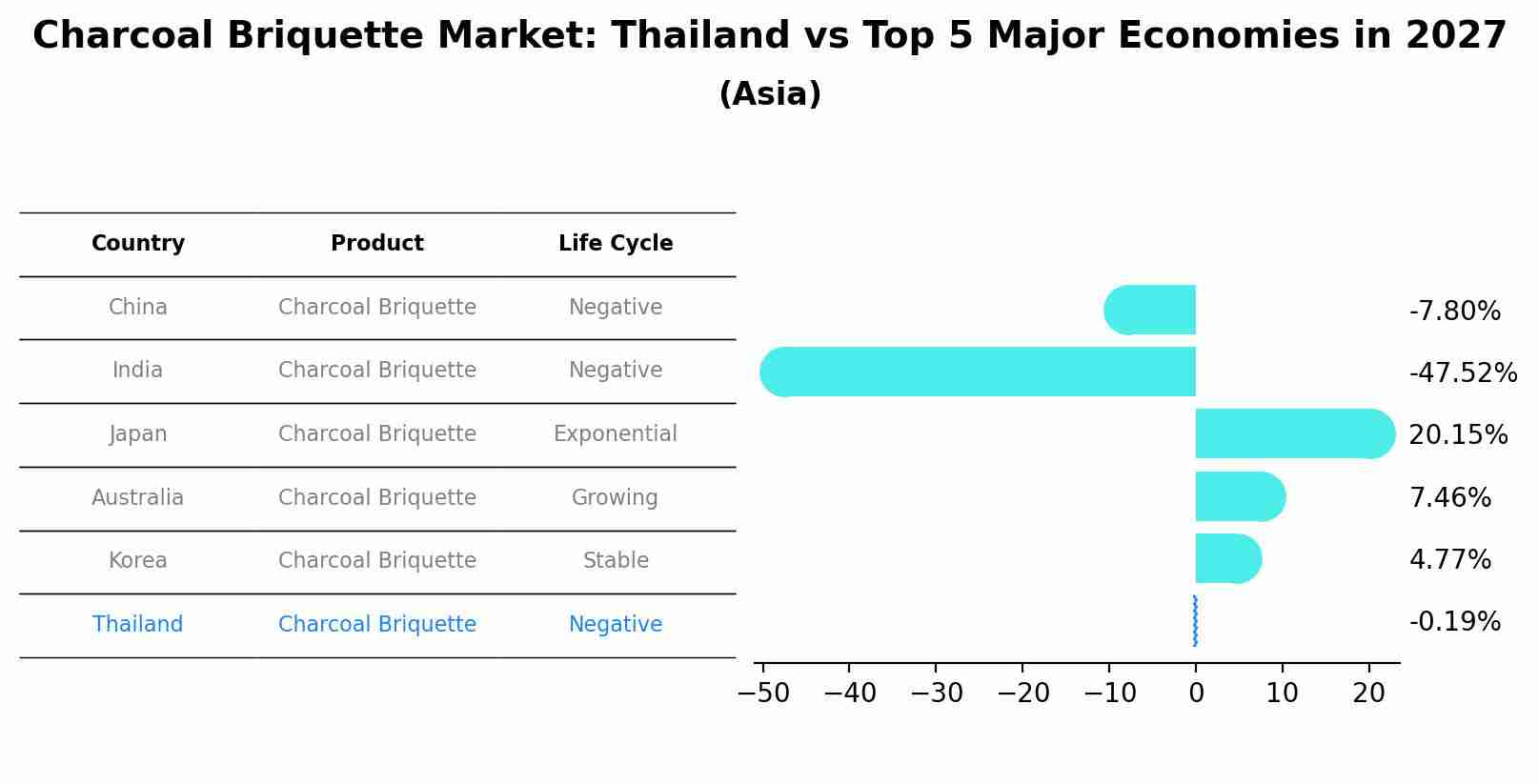Thailand Charcoal Briquette Market (2025-2031) Outlook | Value, Size, Analysis, Companies, Revenue, Industry, Trends, Growth, Share & Forecast
| Product Code: ETC286525 | Publication Date: Aug 2022 | Updated Date: Apr 2025 | Product Type: Market Research Report | |
| Publisher: 6Wresearch | No. of Pages: 75 | No. of Figures: 35 | No. of Tables: 20 | |
Thailand Charcoal Briquette Market Size Growth Rate
The Thailand Charcoal Briquette Market may undergo a gradual slowdown in growth rates between 2025 and 2029. Although the growth rate starts strong at -0.13% in 2025, it steadily loses momentum, ending at -0.49% by 2029.

Charcoal Briquette Market: Thailand vs Top 5 Major Economies in 2027 (Asia)
The Charcoal Briquette market in Thailand is projected to grow at a negative growth rate of -0.19% by 2027, highlighting the country's increasing focus on advanced technologies within the Asia region, where China holds the dominant position, followed closely by India, Japan, Australia and South Korea, shaping overall regional demand.

Thailand Charcoal Briquette Market Synopsis
The Thailand Charcoal Briquette market is experiencing significant growth, driven by the increasing awareness of environmental sustainability and the demand for cleaner energy sources. Charcoal briquettes are considered an eco-friendly alternative to traditional charcoal, as they are made from sustainable materials and produce less smoke and ash. The market`s growth is also influenced by the rising popularity of outdoor cooking and grilling, as well as the hospitality industry`s use of charcoal briquettes for barbecues. Government initiatives to promote sustainable energy sources and reduce deforestation have further supported the market`s expansion. Additionally, the availability of a wide range of charcoal briquette products, including flavored and long-burning varieties, has contributed to increased consumer adoption.
Drivers of the Market
The Thailand Charcoal Briquette market`s growth is influenced by several factors. Firstly, the rising awareness of environmental issues and the need for sustainable fuel sources have increased the demand for charcoal briquettes as an eco-friendly alternative to traditional charcoal. Secondly, the popularity of outdoor cooking and barbecues is boosting the demand for charcoal briquettes. Lastly, government initiatives promoting sustainable energy sources also support the market`s expansion.
Challenges of the Market
The Thailand charcoal briquette market encounters challenges related to sustainable sourcing of raw materials. Deforestation and illegal logging can affect the availability of wood for briquette production. Environmental concerns also require manufacturers to adopt sustainable production practices. Additionally, competition from alternative fuel sources like gas and electricity can impact the market`s growth. Educating consumers about the environmental benefits of using charcoal briquettes is crucial to maintaining market demand.
COVID-19 Impact on the Market
COVID-19 had a mixed impact on the charcoal briquette market in Thailand. While there was an initial decline in sales due to restrictions on outdoor gatherings and reduced tourism, the market saw increased demand for home barbecues and cooking as people stayed home. Producers adapted to changing consumer preferences, emphasizing the convenience and eco-friendliness of their products.
Key Players in the Market
Prominent players in the Thailand Charcoal Briquette market include PT. Ruby Privatindo, Thai Sumi Co., Ltd., and Kingsford Products Company. These companies produce high-quality charcoal briquettes used for grilling and cooking, catering to the growing demand for eco-friendly fuel alternatives.
Key Highlights of the Report:
- Thailand Charcoal Briquette Market Outlook
- Market Size of Thailand Charcoal Briquette Market, 2024
- Forecast of Thailand Charcoal Briquette Market, 2031
- Historical Data and Forecast of Thailand Charcoal Briquette Revenues & Volume for the Period 2021-2031
- Thailand Charcoal Briquette Market Trend Evolution
- Thailand Charcoal Briquette Market Drivers and Challenges
- Thailand Charcoal Briquette Price Trends
- Thailand Charcoal Briquette Porter's Five Forces
- Thailand Charcoal Briquette Industry Life Cycle
- Historical Data and Forecast of Thailand Charcoal Briquette Market Revenues & Volume By Type for the Period 2021-2031
- Historical Data and Forecast of Thailand Charcoal Briquette Market Revenues & Volume By Wood Type for the Period 2021-2031
- Historical Data and Forecast of Thailand Charcoal Briquette Market Revenues & Volume By Others for the Period 2021-2031
- Historical Data and Forecast of Thailand Charcoal Briquette Market Revenues & Volume By Application for the Period 2021-2031
- Historical Data and Forecast of Thailand Charcoal Briquette Market Revenues & Volume By Metallurgical Industry for the Period 2021-2031
- Historical Data and Forecast of Thailand Charcoal Briquette Market Revenues & Volume By BBQ for the Period 2021-2031
- Historical Data and Forecast of Thailand Charcoal Briquette Market Revenues & Volume By Others for the Period 2021-2031
- Thailand Charcoal Briquette Import Export Trade Statistics
- Market Opportunity Assessment By Type
- Market Opportunity Assessment By Application
- Thailand Charcoal Briquette Top Companies Market Share
- Thailand Charcoal Briquette Competitive Benchmarking By Technical and Operational Parameters
- Thailand Charcoal Briquette Company Profiles
- Thailand Charcoal Briquette Key Strategic Recommendations
Frequently Asked Questions About the Market Study (FAQs):
- Single User License$ 1,995
- Department License$ 2,400
- Site License$ 3,120
- Global License$ 3,795
Search
Related Reports
- Saudi Arabia Manlift Market (2025-2031) | Outlook, Size, Growth, Trends, Companies, Industry, Revenue, Value, Share, Forecast & Analysis
- Uganda Excavator, Crane, and Wheel Loaders Market (2025-2031) | Strategy, Consumer Insights, Analysis, Investment Trends, Opportunities, Growth, Size, Share, Industry, Revenue, Segments, Value, Segmentation, Supply, Forecast, Restraints, Outlook, Competition, Drivers, Trends, Demand, Pricing Analysis, Competitive, Strategic Insights, Companies, Challenges
- Rwanda Excavator, Crane, and Wheel Loaders Market (2025-2031) | Strategy, Consumer Insights, Analysis, Investment Trends, Opportunities, Growth, Size, Share, Industry, Revenue, Segments, Value, Segmentation, Supply, Forecast, Restraints, Outlook, Competition, Drivers, Trends, Demand, Pricing Analysis, Competitive, Strategic Insights, Companies, Challenges
- Kenya Excavator, Crane, and Wheel Loaders Market (2025-2031) | Strategy, Consumer Insights, Analysis, Investment Trends, Opportunities, Growth, Size, Share, Industry, Revenue, Segments, Value, Segmentation, Supply, Forecast, Restraints, Outlook, Competition, Drivers, Trends, Demand, Pricing Analysis, Competitive, Strategic Insights, Companies, Challenges
- Angola Excavator, Crane, and Wheel Loaders Market (2025-2031) | Strategy, Consumer Insights, Analysis, Investment Trends, Opportunities, Growth, Size, Share, Industry, Revenue, Segments, Value, Segmentation, Supply, Forecast, Restraints, Outlook, Competition, Drivers, Trends, Demand, Pricing Analysis, Competitive, Strategic Insights, Companies, Challenges
- Israel Intelligent Transport System Market (2025-2031) | Strategy, Consumer Insights, Analysis, Investment Trends, Opportunities, Growth, Size, Share, Industry, Revenue, Segments, Value, Segmentation, Supply, Forecast, Restraints, Outlook, Competition, Drivers, Trends, Demand, Pricing Analysis, Competitive, Strategic Insights, Companies, Challenges
- Uganda Precast and Aggregate Market (2025-2031) | Strategy, Consumer Insights, Analysis, Investment Trends, Opportunities, Growth, Size, Share, Industry, Revenue, Segments, Value, Segmentation, Supply, Forecast, Restraints, Outlook, Competition, Drivers, Trends, Demand, Pricing Analysis, Competitive, Strategic Insights, Companies, Challenges
- Australia IT Asset Disposal Market (2025-2031) | Strategy, Consumer Insights, Analysis, Investment Trends, Opportunities, Growth, Size, Share, Industry, Revenue, Segments, Value, Segmentation, Supply, Forecast, Restraints, Outlook, Competition, Drivers, Trends, Demand, Pricing Analysis, Competitive, Strategic Insights, Companies, Challenges
- UAE Building Thermal Insulation Market Outlook (2025-2031) | Revenue, Companies, Share, Trends, Growth, Size, Forecast, Industry, Analysis & Value
- Portugal Electronic Document Management Market (2025-2031) | Strategy, Consumer Insights, Analysis, Investment Trends, Opportunities, Growth, Size, Share, Industry, Revenue, Segments, Value, Segmentation, Supply, Forecast, Restraints, Outlook, Competition, Drivers, Trends, Demand, Pricing Analysis, Competitive, Strategic Insights, Companies, Challenges
Industry Events and Analyst Meet
Our Clients
Whitepaper
- Middle East & Africa Commercial Security Market Click here to view more.
- Middle East & Africa Fire Safety Systems & Equipment Market Click here to view more.
- GCC Drone Market Click here to view more.
- Middle East Lighting Fixture Market Click here to view more.
- GCC Physical & Perimeter Security Market Click here to view more.
6WResearch In News
- Doha a strategic location for EV manufacturing hub: IPA Qatar
- Demand for luxury TVs surging in the GCC, says Samsung
- Empowering Growth: The Thriving Journey of Bangladesh’s Cable Industry
- Demand for luxury TVs surging in the GCC, says Samsung
- Video call with a traditional healer? Once unthinkable, it’s now common in South Africa
- Intelligent Buildings To Smooth GCC’s Path To Net Zero













